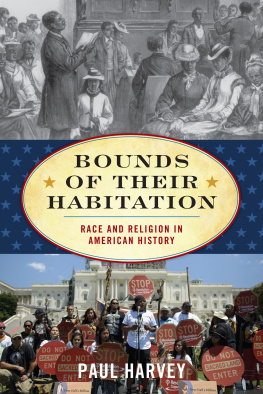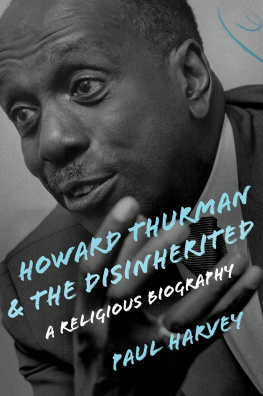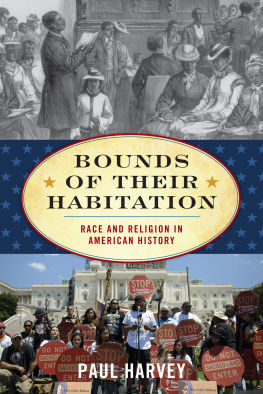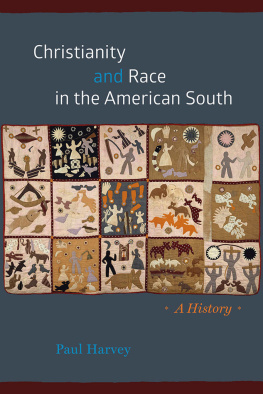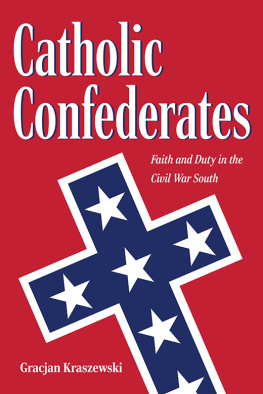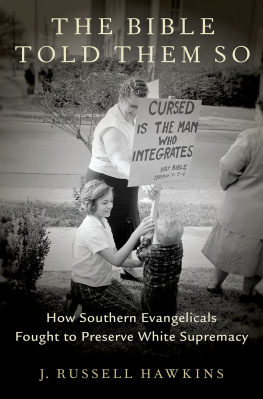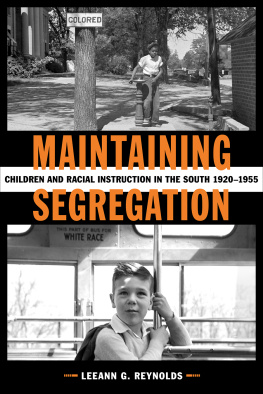2005 The University of North Carolina Press
All rights reserved
Manufactured in the United States of America
Designed by April Leidig-Higgins
Set in Minion by Copperline Book Services, Inc.
The paper in this book meets the guidelines for permanence and durability of the Committee on Production Guidelines for Book Longevity of the Council on Library Resources.
Library of Congress Cataloging-in-Publication Data
Harvey, Paul, 1961
Freedoms coming: religious culture and the shaping of the South from the Civil War through the civil rights era / Paul Harvey.
p. cm. Includes bibliographical references and index.
ISBN 0-8078-2901-3 (cloth: alk. paper)
1. Southern StatesChurch history. 2. Southern StatesRace relationsHistory. 3. Protestant churchesSouthern StatesHistory. 4. Race relationsReligious aspectsChristianity History. I. Title.
BR535.H38 2005
277.5082dc22 2004013687
09 08 07 06 05 5 4 3 2 1
Publication of this work was aided by a generous grant from the Z. Smith Reynolds Foundation.
for Leon F. Litwack and Samuel S. Hill
tell about the South
Contents
Introduction.
Freedom and Its Coming
CHAPTER ONE
Redemption: Religion, Race, and Reconstruction in the South, 18611900
CHAPTER TWO
Freedoms Struggles: Southern Religious Populism, Progressivism, and Radicalism, 18901955
CHAPTER THREE
The Color of Skin Was Almost Forgotten for the Time Being: Racial Interchange in Southern Religious Expressive Cultures
CHAPTER FOUR
Religion, Race, and Rights
CHAPTER FIVE
Religion, Race, and the Right
Epilogue.
The Evangelical Belt in the Contemporary South
Acknowledgments
As this book shows, freedoms coming has many meanings. Having worked on the subject of religion and race in the South for nearly twenty years now, perhaps freedoms coming is, for me, the long-awaited end of this book project. Yet, I wouldnt trade anything for the journey, which has taken me across the country in search of treasure troves in libraries and archives, introduced me to a generous cast of people in and out of academia and religious communities, and inspired me to think deeply about questions at the heart of American history.
I have been blessed with generosity from people, granting agencies, librarians and archivists, and institutions too numerous to mention. Early in the project, a grant from the Louisville Institute got me started, and assistance from the University of Colorados Committee on Research and Creative Works provided funding for research travel. Subsequent research grants from the American Academy of Religion Research Grant Program, the Womens Studies Research Grant Program at Duke University, the Behind the Veil Project Research Grant also at Duke, and the Gilder Lehrman Institute of American History provided the resources for extensive research trips to libraries and archives stretching from New Orleans to New York. Very late into the project, after I turned in the original manuscript, research funds from the Institute for Oral History at Baylor University and the University of Wisconsin Friends of the Library Fellowship provided for supplementary archival time that enriched the last two chapters of the book. A years leave provided by the National Endowment for the Humanities in 19992000 provided me the intellectual space for writing most of the first draft of the manuscript. In the spring of 2001, a semesters support at the Virginia Foundation for the Humanities in Charlottesville afforded me intellectual companionship (as well as evenings of fried chicken and cheap pinot noir and listening to Billie Holiday and Brahms) for which I will ever be gratefuland for that, I am ever in the debt of Roberta Culbertson and Nancy Damon of the foundation, and my fellow fellows and treasured friends Anne Jones, Ralph Luker, Jahan Ramazani, Lauren Winner, and Grace Elizabeth Hale.
Over and over, librarians and archivists directed me to sources I would have missed or passed over too easily. I wish especially to thank Elizabeth Dunn of the Special Collections Library at Duke; the wonderful staff of the Southern Historical Collection in Chapel Hill; Harold Hunter of the Pentecostal Holiness Church Archives in Oklahoma City; Glenn Gohr of the Assemblies of God Archives in Springfield, Missouri; Bill Sumner of the Southern Baptist Historical Library and Archives in Nashville; Rebecca Hankins of the Amistad Research Center in New Orleans; and Laurie Williams of the interlibrary loan department at the University of Colorado in Colorado Springs.
Friends and colleagues gave extravagantly of their time to read portions or all of this manuscript. Several of them gave it ruthless and needed critiques and improved the work immeasurably as a result. Beth Schweiger of the University of Arkansas worked over my writing with her famously active red pen, and Colleen McDannell of the University of Utah raised probing questions and numerous useful suggestions. My good friend and co-editor of two other books, Philip Goff of the Center for the Study of Religion and American Culture at IUPUI, has been a steady source of help, as well as college hoops analysis, since our days together in the Young Scholars in American Religion program. David Chappell of the University of Arkansas has been a valued intellectual colleague and sparring partner over the material in Chapter 5. I also received help, support, advice, research notes, admonitions, laughter, crash pads, wine recommendations, and, of course, restaurant tips and baseball tickets from numerous other friends and colleagues along the way, including Donald G. Mathews, Glenda Gilmore, Jane Dailey, Fitzhugh Brundage, Clarence Walker, Waldo Martin, Andrew Manis, Barry Hankins, Will Glass, Randy Sparks, Xiaojian Zhao, Cita Cook, Randall Stephens, Tracy Fessenden, Anthea Butler, David Morgan, Yvonne Chireau, Joel Martin, Daniel Stowell, Karen Kossie, Greg Wills, Julia Walsh, Barbara Savage, Wayne Flynt, Charles Reagan Wilson, Ted Ownby, Larissa Smith, Pat Sullivan, Houston Roberson, Sarah Gardner, Emma Lapsansky, Julie Greene, Stephanie Paulsell, Sariya Jarasviroj, Sue Ann Marasco, and my valued colleagues in the History Department at cu-Colorado Springs, including Harlow Sheidley, Chris Hill, Rick Wunderli, Rob Sackett, Christina Jimenez, Jan Myers, and Judy Price.
The University of North Carolina Press has been a most supportive friend of three of my projects now. For that, thanks go especially to Elaine Maisner, who took in this prodigal son project and offered expert counsel throughout.
I have dedicated this work to two teacher-scholars who profoundly have influenced me both personally and professionally. As for Susan Nishida, freedoms coming is surely the end of this book project as well, for she has lived with it for nearly a decade, even while reminding me of the constant sacrament of praise and what it means to see it again for the first time.
Paul Harvey
July 2004


